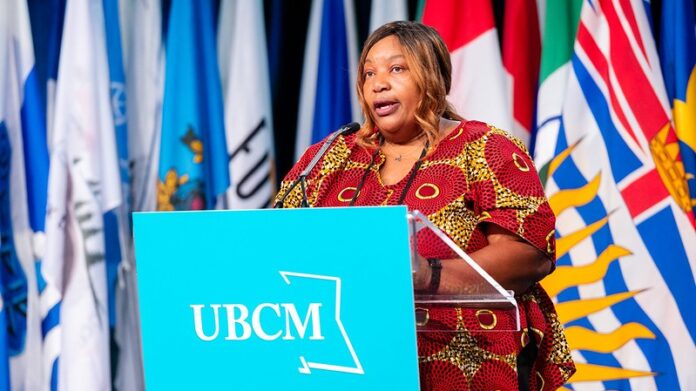Members of local governments and First Nations are gathering in Victoria next week for the annual Union of B.C. Municipalities (UBCM) convention.
The convention will consider and vote on hundreds of resolutions across a wide range of topics, including infrastructure, affordable housing, UNDRIP and more.
UBCM President Trich Mandewo said this year’s gathering is coming at a critical time for British Columbia, amid economic pressures from tariffs and a growing provincial deficit.
“Local governments are under tremendous pressure due to significant gaps in provincial services. We are under pressure because we are the ones closest to the community,” said Mandewo.
“Local governments are being asked to fill that gap. All the while, we are not given any additional funding to do this work,” she said.
Infrastructure funding among top issues for UBCM
Infrastructure funding is a major concern for this year’s convention.
The UBCM says there’s a lack of financial tools to keep up with infrastructure needs and delays in provincial permitting processes.
It said local governments are more often taking on tasks that have historically been up to the provincial and federal government. That includes providing lands and support for non-market and supportive housing, bearing costs of medical emergency response, and managing a growing number of homeless encampments.
The federal government offers communities infrastructure funding through the Canada Community-Building Fund, which is administered in B.C. by the UBCM.
The province mainly distributes infrastructure funding to local governments through a variety of grant programs.
A resolution to be considered would call on the province to invest in a long-term, allocation-based funding program to support local government infrastructure servicing needs.
Premier David Eby acknowledged during a visit to Ottawa Thursday that infrastructure and keeping with with population growth is a major concern for local governments.
Eby said his message for the federal government was that B.C. needs more support for infrastructure.
Affordable housing
Another resolution brought forward by the UBCM would call on the provincial government to co-ordinate a regional approach to homelessness to address service gaps between communities.
The resolution includes a request to increase funding and resources for supportive housing and shelter initiatives across the province.
“We will continue to work with all local governments to understand challenges and opportunities to ensure people can thrive in the communities they call home,” said Housing and Municipal Affairs Minister Christine Boyle in a statement to Vista News.
“We will also continue to work with our federal counterparts on long-term affordable housing solutions for British Columbia, as we determine next steps for our priority projects here at home.”
The federal government announced the launch of a new agency this week called Build Canada Homes, to build more affordable housing across the country.
Boyle called it a “good start,” but noted the initial plan doesn’t include any B.C. projects.
“We have an abundance of shovel-ready affordable housing projects here and look forward to hearing what partnerships will be allocated to B.C. with the remaining funding.”
Confusion about Indigenous land rights vs. private property
Mandewo said reconciliation and implementing the United Nations Declaration of the Rights (UNDRIP) of Indigenous Peoples will be a priority for discussions during this year’s convention.
She said UBCM members want more information from the province about how decisions like the recent Cowichan Tribes v. Canada decision will impact local property rights.
A resolution put forward by the Tla’amin First Nation this year would requests that the Province support local governments to transform their approach to reconciliation with the development of a toolkit for UNDRIP implementation and associated funding.
UBCM notes it’s also the first resolution submitted by a UBCM First Nation member.
Library funding lags behind in B.C.
A resolution says provincial funding for libraries should be more than doubled to $30 million per year.
B.C. libraries get most of their funding from local governments, but UBCM leaders say the provincial government’s share of library funding has been steadily decreasing over four decades – from 21 percent of total revenue collected by libraries in 1986 to six percent in 2022.
They note the $14 million of core funding from the province for B.C. library systems has not increased since 2010.
Meanwhile, they note libraries have increasingly been acting as front-line community services for those with mental health and addictions issues, or operating as heating and cooling shelters during extreme weather events.
The UBCM convention takes place from Sept. 22-26th at the Victoria Conference Centre.
The leaders of all B.C.’s political parties are set to speak at the convention, including and address by Eby on the final day.






